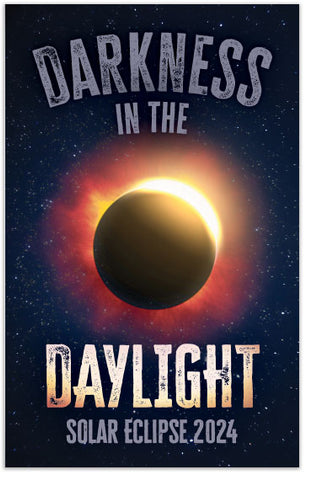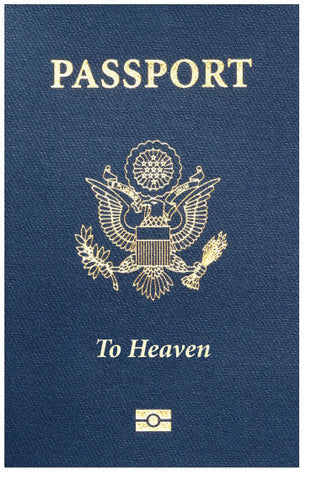Christ the Eternal Lover (KJV)
Special-Order Folded Tract
 NOTE: This item is custom-printed to order (click for more details).
NOTE: This item is custom-printed to order (click for more details).
This tract is from our print-on-demand library, and is not kept in stock. Select the options below, and we will custom-print a batch just for you. Because this item is custom-printed, you can add your custom imprint to the back page at no extra cost.
- Estimated shipping date: Monday, March 16 (Click for more details)
- SKU:
- Discounts: Discount coupons do not apply to this item
- Format: Folded Tract
- Size: 3.5 inches x 5.5 inches
- Pages: 8
- Imprinting: Available with 5 lines of custom text
- Version: KJV
- Returns: Because this item is custom-printed to order, it cannot be returned.
Show all item details
The full text of this tract is shown below in the KJV version. (Do you want to print this tract in a different version than the one listed? Contact us and let us know what you're looking for—we may be able to create the alternate version for you at no charge.)
“For this cause shall a man leave his father and mother, and shall be joined unto his wife, and they two shall be one flesh. This is a great mystery, but I speak concerning Christ and the Church” (Eph.5:31-32).
WHAT IS THE GREAT MYSTERY?
The source of Scripture which the apostle bases his statement on is taken from Genesis 2:21-24 where the formation and the presentation of Eve by God to Adam, is described. Since then many men have left their father and mother to be joined in matrimony to their wives, so this is no mystery for us today.
Paul is referring to Christ and His Bride, the Church, as the great mystery, basing his premise on the Word of God from Genesis 2:24. There it is recorded—“Therefore shall a man leave his father and his mother and shall cleave to his wife; and they shall be one flesh.” By these words it is indicated that the man is to cleave to the woman, not the woman to the man! How many fail to see and to accept this responsibility!
What is the mystery in relation to Christ and His Bride? Is it not a great mystery to us that Christ, the eternal Son of God, left His Father above to cleave to His Bride and that they would be eternally one? It is His great eternal love and faithfulness by which He cleaves forever to His Bride. This enables the believer in Christ to confess that it is not my feeble grip on Christ, not my weak cleaving to Him that fills my heart with assurance and joy, but His cleaving to me in a deathless and ceaseless love that will never let me go! He is my great eternal Lover and this is indeed a great mystery!
The first marriage—was it a permanent success? Unfortunately not, for though living in a perfect paradise, the serpent disrupted the peace and harmony of it, destroying the blessed fellowship which Adam and Eve enjoyed with God. We are not informed how long its perfection lasted, but through the deception of Satan, Eve was led to disobey the Word of God unknown to Adam.
THE FIRST MARRIAGE IN EDEN
It is possible that Satan knew it would be more difficult to deceive Adam and therefore approached the woman who was the dearest object of Adam’s affection, and through her bring about the ruin of Adam also. The Scripture in
1 Timothy 2:14 seems to be in accord with this, saying, “And Adam, was not deceived, but the woman being deceived was in the transgression.”
When Eve was evidently alone, Satan grasped his opportunity and spoke to her through the wisest and most beautiful of God’s creatures, pressing on her his subtle temptation. It was evidently an unnatural voice, not of God as later in the case of Balaam’s ass in Numbers 22:28-30. Thus Eve fell by deception from a state of innocence and holy fellowship with God into a state of moral and spiritual death!
ADAM’S DILEMMA
We have no way of determining the lapse of time between Eve’s disobedience and that of Adam’s. His intelligence had not been subjected to the deceptiveness of the Adversary and he must have been fully aware of the tragic consequences of Eve’s fall when learning of it. This brought him face to face with the greatest problem of life up to that time in the Garden of Eden.
What was his dilemma? Was not he in a perfect state of innocence and in communion with God while now his wife was under God’s judgment? What would he do? He knew to be true that a terrible gulf of separation existed between them. She was in a state of misery and bondage; a state of spiritual death that could separate them forever. In this he was not deceived. The test was, should he cleave to God or to his wife? What he may have longed to do was an impossibility! He may have greatly desired to lift her up and restore her to her previous condition, but he was only human and possessed no such power. He must choose to cleave to God or to his wife.
ADAM’S DECISION
Deliberately, decidedly and fully undeceived, knowing the consequences, but consumed with the deepest affection for his wife, he made the choice to descend to her level and become a partaker with her in spiritual ruin and death! He did not fall into sin by deception but by affection! He decided to cleave to his wife and share the consequences, stooping to become like his fallen bride and be under sin and divine judgment.
THE LOVE STORY OF THE LAST ADAM
“The last Adam”—Christ—He is the eternal Lover! The story of His love concerns His departure from heaven above, leaving His Father’s home in glory to obtain and to purchase His Bride, His Church. When He descended from the glory above to obtain His Bride, He could not become like her in her sin and shame, though coming down to her level on earth, but He came rather to impart His own life and lift her up to His own level in glory! What a contrast is He to “the first Adam”!
The tremendous stoop of Christ, the Bridegroom of the Church, is described in Philippians 2:6-8, revealing that by His own voluntary will in love for His Bride, He became man, not only for time but for eternity! Though co-equal and co-eternal with God His Father, yet He empties Himself to take “the form of a servant” or slave.
HIS DESCENDING LOVE
He descends to take “the form of a slave.” Can we comprehend it? The Greek word “form” in both cases, is the word “morphe.” An excellent definition of the word is given by Gifford—“Morphe” is therefore properly the nature or essence, not in the abstract, as actually subsisting in the individual, and retained as long as the individual itself exists. Thus in the passage before us “morphe Theou” is the divine nature actually and inseparably subsisting in the Person of Christ. The two phrases—“the form of God” and “the form of a servant”—are directly antithetical, and that “form” must therefore have the same sense in both.” Quoted from Gifford in The Incarnation.
The measure of our human understanding of the mystery of His self-emptying is to know that He made Himself void of all that would hinder Him from being a bond-slave to obtain the object of His eternal love—His Bride! It is a matchless and mysterious love that He should stoop to take the lowest possible place for us—the Form of a Slave!
“But the high mysteries of His Name
The creature’s grasp transcend;
The Father only (glorious claim!)
The Son can comprehend.
THE CONTINUED DESCENT OF HIS LOVE
He was made “in the likeness of men” as He descended further toward His Bride in order to reach her in the place of her shame, misery and death. Yet as Man, He was not sinful as was His Bride whom He came to save. “He knew no sin” (2 Corinthians 5:21). “He did no sin” (1 Peter 2:22). “In Him was no sin” (l John 3:5). He was the impeccable Christ! He was as holy on the Cross as He had been in life; holy in life as He was in the manger! Holy in the manger as in the eternal Godhead in the past ages of eternity! He was the incomparable God-Man—a human Person with no taint of sin, impeccable! His Bride can say, “Yea, He is altogether lovely” (Song of Solomon 5:16).
Yet even in His Incarnation He does not reach His Bride, for she lies lower still in the depths of her sinful shame. It was not by His perfect humanity that He could lift her out of the depths of sin. Though “found in fashion as a man,” experiencing human poverty, weariness, hunger, sorrow, suffering, grief and all the changes of earthly life, yet in all this He could not reach His Bride. He knew that He must go down into the depths of death for her!
HIS DEEPEST DESCENT
Down to the depths of deepest suffering and woe He must go to reach His Bride; and for this He “became obedient unto death, even the death of the Cross” (Philippians 2:8). It is on the Cross, by His own death, that He takes her guilt and shame, bearing her curse and judgment, making it all His own; and it is there that at last He reaches her! Instead of His Bride paying the terrible penalty of eternal judgment for her own sins—He pays it! He purchases His Bride! For Christ “loved the Church and gave Himself for it” (Ephesians 5:25).
“The Father in His willing love
Could spare Thee from His side;
And Thou couldst stoop to bear above—
At such a cost—Thy Bride!”
He reaches His Bride, the object of His eternal affection, and lifts her up to His own level of glory above! She has died with Him! She is made alive in Him. She is raised with Him! She is seated together with Him (Col. 3:1-3; Eph. 2:4-6).
THE CLIMACTIC EVIDENCE OF HIS ETERNAL LOVE
This is typified in the Old Testament commandment of Exodus 21:1-6, where God’s instructions are stated relative to the freedom of a slave who had terminated his service to his master. When set free, if married when he became a slave, his family was to go out free with him. If not married at the commencement of his servitude and a wife and children obtained during it, they were retained as his master’s possession. He was given the choice of refusing his freedom by declaring-“I love my master, my wife and my children, I will not go out free” (Exodus 21:5).
Then his master brought him to the judge and to the door post and his ear was bored through with an awl, the sign of becoming a servant forever (Exodus 21:6). His affection for the master, his wife and children is of greater value to him than his personal freedom, producing a voluntary submission of perpetual service. This Old Testament act portrays the climactic evidence of the love of Christ in submission to His Father and His eternal love for His Bride, the Church.
CHRIST’S SERVITUDE TO HIS FATHER
The complete redemptive purposes of God have all been entrusted to His Son for their fulfillment, right down to the end of the ages. There are yet future purposes to be finalized—the Rapture of the saints; the Great Tribulation; the Judgment Seat of Christ; the Judgment of the Nations; the restoration of Israel; the Millennial Kingdom; the final judgment of Satan; and the last great court session, the Great White Throne Judgment, when the unsaved dead will be raised and eternally banished. Then comes the end
(1 Corinthians 15:24). “All things will have been put in subjection under His feet” (1 Corinthians 15:27). There will be nothing further to do! The Son will then—“at the end of His servitude” deliver up the kingdom to God, even the Father according to 1 Cor. 15:24, that God may be all in all!
Will the Son then be given His freedom? Will He fully return to His original glory from where He came by giving up His Manhood? Everything in the universe will be in proper relationship with God forever, the work of redemption and of judgment completed by the Son. He deserves His freedom, but what of His Bride? Can He take her with Him? If He goes, He must go alone!
CHRIST PROVES TO BE THE ETERNAL LOVER
As in the case of the servant of Exodus 21, the Son Himself makes a voluntary choice, for we read in 1 Corinthians 15:28—“Then shall the Son also Himself be subject unto Him that put all things under Him, that God may be all in all.” We can never depreciate the intrinsic glories and universal greatness of the Beloved Son of God, both now and forever (John 17:5); but far greater than all the eternal glories into which He will bring His Bride, the Church (John 17:22), will be her eternal lover Himself! His love for His Bride far exceeds all the glories of the New Creation to come! Through all eternity, the Son retains “the form of a servant” (although highly exalted)—maintaining His subjection to God as Man forever, although, as we said, there will be glories His bride can never enter into (John 17:5). The last Adam will never leave His Master and His Bride!
In substance the Son declares, “I love My Master; My wife, My children. I will not go out free.” As much as to say, “For My Bride I became a slave; for her I died. I gave her new life. I lifted her from the lowest depths of sin and shame; from hell itself, to bring her to the heights of My glory with me. My inheritance I valued for her sake. She is my Co-heir, My joy, My crown. I wore the crown of thorns for her. I bore the greatness of God’s wrath and judgment to redeem her. For her I bear My scars through all eternity and count her My most precious possession. I will not go out free; for her I became a Man, a servant forever! Through eternal ages My Bride will be forever by My side!”
“A man shall leave his father and mother and shall be joined to his wife and they two shall be one flesh. This is a great mystery, but I speak concerning Christ and the Church” (Eph. 5:31-32). Christ is my eternal Lover! He will never let me go! J. W. Bramhall
“O Love, that wilt not let me go,
I rest my weary soul in Thee;
I give Thee back the life I owe
That in Thine ocean depths
Its flow May richer, fuller be!”
Matthewson















